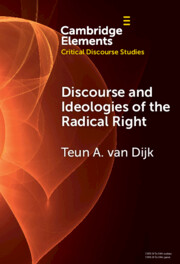Element contents
Discourse and Ideologies of the Radical Right
Published online by Cambridge University Press: 30 November 2024
Summary
- Type
- Element
- Information
- Online ISBN: 9781009549929Publisher: Cambridge University PressPrint publication: 02 January 2025
References
- 1
- Cited by

